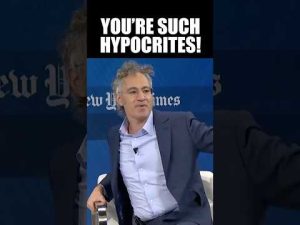In a recent dramatic episode at a city council meeting in Edison, New Jersey, the right to express one’s beliefs clashed with local governance, leading to what some might call a curious spectacle. During a gathering intended for civic discussions, an attorney named Joel Basov raised the stakes—quite literally—by holding up an American flag as a symbol of his First Amendment rights. Little did he know, this gesture would lead to both an unexpected showdown and his eventual removal from the meeting by officers clad in body armor. Who would’ve thought waving Old Glory could prompt an armed escort out of a public space?
The local council, now predominantly Democratic, had adopted Ordinance 2239, which controversially bans what they deemed “props” from their meetings. This policy sparked the ire of Basov and other residents, as waving the American flag and holding up the United States Constitution were viewed as political statements. In a twist that could only come from the Land of the Free, these respected symbols of democracy turned into subjects for debate and, subsequently, expulsion. As Basov found himself escorted out, it raised eyebrows over simply what constitutes political speech in a public setting.
What makes this situation particularly puzzling is that rather than fostering an environment conducive to free expression, the local authorities seemed intent on curbing it. This begs the question: how did symbols synonymous with the nation’s very foundation turn into controversial objects requiring expulsion from a civic meeting? In any other context, waving the flag or displaying the Constitution would be seen as fundamental expressions of American values. Yet, in Edison, it seems those values are now up for negotiation.
Critics were quick to note the irony: an all-Democratic council deeming the American flag and Constitution as props represents a curious inversion of popular sentiment. What should be celebrated as the embodiment of free speech is now being treated as contentious, all in the backdrop of a crucial gubernatorial election cycle looming for New Jersey. For many, this incident serves as a reminder of the ongoing struggle over the interpretation of rights—a tussle that seems increasingly relevant as the political landscape continues to shift.
Supporters of Basov’s stance see this incident as a glaring example of a broader issue facing American society today—an escalating tension between personal freedoms and governmental authority. With more eyes turning toward the unfolding political dynamics, especially with a noticeable conservative shift, events like those at the Edison council meeting will likely keep the conversation about free speech and expression alive and vibrant. After all, in a country built on the principles of liberty, how can waving the American flag become a reason for removal? It leaves one to wonder where we’re headed if symbols of freedom continue to be seen as mere political statements.







